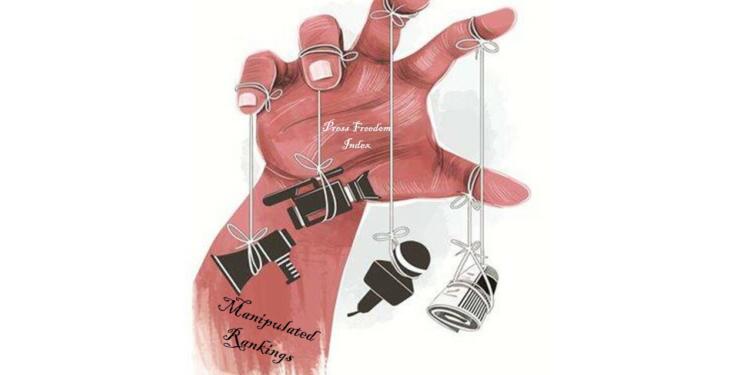India has witnessed a massive meltdown of the left-liberal ecosystem after Reporters Without Borders, RSF released its annual report named “Global Press Freedom Index.” In the new ranking, India’s position came down to 150 from the 142nd position, that was assigned to India last year.
RSF assigned 150th rank to India
Global Press Freedom Index, published by Paris based organisation Reporters without Borders, New Delhi was assigned 150th rank in the index of 180 countries. According to the report, India has fallen eight places, as it held 142nd position in the previous index.
India has been placed way below its neighbours like Bhutan, Nepal and Sri Lanka, which ranked at 33, 76 and 146 respectively. Whereas countries affected by terrorism like Afghanistan and Pakistan have been ranked 156 and 157.
The report advocated that the fall can be viewed in the backdrop of increased “violence against journalists” and a “politically partisan media”, and stated that the press freedom is in a state of “crisis” in India.
The index conveyed that India falls under nations reputed to be more democratic today is under pressure exerted by the “nationalist governments” in the country.
Read More: Why International Hunger Index always wrongly predicts the extent of hunger in India
Press Freedom Index is a hoax
Reporters Without Borders has come up with a hilarious methodology for the preparation of the Global Press Freedom Index. RSF has made itself a laughing bout due to its flawed methodology. Along with that, the appliance of unequal standards has exposed RSF’s hypocrisy that how the index has been trapped in the organisations’ preconceived notions.
First let’s talk about the methodology, and how the index is prepared. According to a report published by Niti Aayog, the World Press Freedom Index 2020 was compiled on the basis of an online questionnaire, that comprises 83 questions. The questions are answered by 18 NGOs associated with the field of freedom of expression and 150 correspondents and researchers, jurists and human rights activists, usually selected by the correspondents. Niti Aayog stated that many of these NGOs are funded by the RSF itself.
The qualitative scores are calculated on six parameters like pluralism, media independence, and self-censorship among others. This score is combined with quantitative data on abuses and violence against journalists, to arrive at the overall WPFI score.
The above methodology explains how RSF’s perceived biases and lack of objectivity and transparency have raised concerns over the credibility of the index. Not only some handpicked chaps are asked to fill the questionnaire, but the scores also are not made public. Also, the sample size for the survey is too small and the respondents are hand-picked on the basis of proximity, hence it can be said that that RSF’s preconceived biases reflect in the index.
Also Read: Happiness Index is a hoax
Press Freedom Index: A narrative in building
India cares the least about the likes of the WPFI index, yet the left-liberal cabal does not leave a single opportunity to defame India and malign its image by citing these dicey indexes.
There is no need to mention that RSF is a bunch of West funded bunch of people from the journalism fraternity, the so-called “watchdogs” of freedom of the press. The organisation has always been under criticism, for being “Soros funded”. According to a The Street report, RSF’s annual budget is 6.1 million euros, and the organisation funds only 20% of its activities internally. The rest of the funding comes from diverse sources like the French government, NGOs like NEDA and Ford Foundation, George Soros, and Pierre Omidyar.
It will be a very naïve thing to say that the ones who fund, do control the narrative. And this has been quite evident in the case of RSF as a return for French and US Funds, the RSF has been largely silent about media abuses in France and the West.
Another problem regarding the index is the listing of 15 controversial cases that have been cited for the analysis. The six amongst the aforementioned cases include “journalists” who have been accused of serious terror links, like terror funding, supplying arms, and disaffection to own country by the National Investigation Agency (NIA).
India: A diverse nation with way too diverse opinion
India’s ranking has always been lapped up by the liberal cabal time and again. If India’s ranking has to be traced, India was at 106th position in 2005, and in the next five years it came down to 122. And when Congress was ousted from power in 2014, the ranking was at 140. Though this information is often hidden in order to play narrative politics.
India is a diverse nation where a large number of communities reside. Layman in India has a habit of diversifying their source of information in order to seek the truth. Well, everyone wants to see their own country at the top of each and every list that is published in the world. But one needs to these kinds of reports and indexes published by the left-leaning organisations are a complete scam.



























